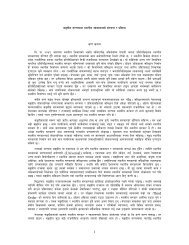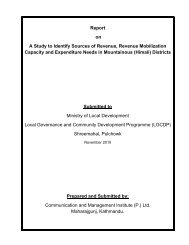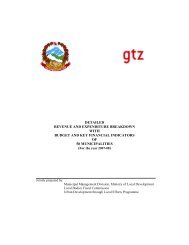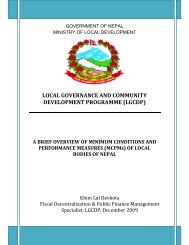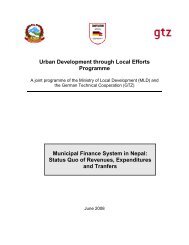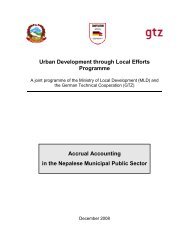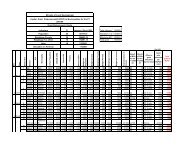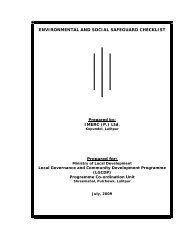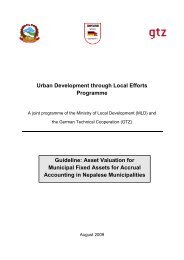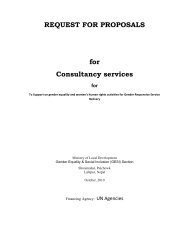GTZ Report on Proposal for Nepal Grant Formula - LGCDP
GTZ Report on Proposal for Nepal Grant Formula - LGCDP
GTZ Report on Proposal for Nepal Grant Formula - LGCDP
Create successful ePaper yourself
Turn your PDF publications into a flip-book with our unique Google optimized e-Paper software.
<strong>Proposal</strong> <strong>for</strong> a municipal grant allocati<strong>on</strong> <strong>for</strong>mula 7<strong>Proposal</strong> <strong>for</strong> a new local government taxati<strong>on</strong> system in a federal <strong>Nepal</strong>From the revenue side of the public ec<strong>on</strong>omy, oiscal aut<strong>on</strong>omy (and resp<strong>on</strong>sibility) is greatest when the subnati<strong>on</strong>al government chooses what taxes it will levy, deoines the bases it will use, sets the rate and preference structure <strong>for</strong> those bases, and administers the taxes that have been adopted (Mikesell 2003).Figure 3 <strong>on</strong> page 7 summarises the optimal design of three major types of income <strong>for</strong> local government bodies if the three guiding principles of c<strong>on</strong>gruence, equivalence and c<strong>on</strong>nectivity would be applied to the three main sources of income of local governments:• User charges (usually <strong>for</strong> utilities) and fees (usually <strong>for</strong> administrative services)• Local taxes• <strong>Grant</strong>s.Figure 3: Revenue types and design criteriaSourceFees and user chargesLocal taxes<strong>Grant</strong>sBasisLocal services where the individual c<strong>on</strong>sumpti<strong>on</strong> is measurable and politic-ally desired (such as water, electricity, solid waste collecti<strong>on</strong>, etc.).Local fees and user charges should be designed that the services provided can be founded (full cost recovery).Local services, where the individual c<strong>on</strong>sumpti<strong>on</strong> is either not measurable, or not desirable.Local taxes, however, should follow the principle of equivalence. There<strong>for</strong>e, the principle of equivalence is extended to local groups beneoitting from loc-al services such as house-‐ and land owners, businesses, or citizens.In an ideal world, grants do fuloil two functi<strong>on</strong>s <strong>on</strong>ly: The serve to guarantee a minimum oinancial basis of local bodies (oiscal functi<strong>on</strong>) and to internalise external spatial effects. after Friedrich 2005Based <strong>on</strong> this optimal design, the following sub-‐secti<strong>on</strong>s deal with• An optimal set of local government taxes (secti<strong>on</strong> 2.2.1 <strong>on</strong> page 9f.),• A reas<strong>on</strong>able sharing of taxes between levels of government (secti<strong>on</strong> 2.2.2 <strong>on</strong> page 9f.),• An optimal set of local government taxes (secti<strong>on</strong> 2.2.3 <strong>on</strong> page 10f.).2.2.1 An optimal set of local government taxesProperty taxes are regarded often as an “optimal” local tax, especially when taking into account Anglo-‐Sax<strong>on</strong> literature. However, this type of tax affect <strong>on</strong>ly a specioic group of the local citizenry and not ne-cessarily the whole community. This tax is an example of a group-‐related equivalence, whereby the as-sumpti<strong>on</strong> is made that property owner beneoit in general from local government decisi<strong>on</strong>-‐making and service delivery bey<strong>on</strong>d user-‐charge based service delivery. Dr Alexander Wegener interpublic c<strong>on</strong>sultancywww.interpublic-‐berlin.de



